Best 32 Moral stories for your kids
1. Two Friends and A Bear
Once two friends were traveling (walking) lonely through a forest. All on a sudden the two friends saw a bear at a distance. Seeing the bear before them, they were very much frightened (terrified). One of the friends climbed up a tree nearby and saved himself. Unfortunately, the other friend did not know how to climb up a tree. So he was helpless. Finding no other alternative way, he lay down on the ground and pretended to be dead. But he knew that a bear does not touch a dead body. In the meantime, the bear came to him and smelt his nose, ears etc. Thinking the man to be dead, he went away. Then his friend got down from the tree, came to him and said to him, “Friend, what did the bear whisper into your ears?” The friend replied that the bear told him not to trust a friend who left him helpless and ran away in times of danger.
Moral: A friend in need is a friend indeed.
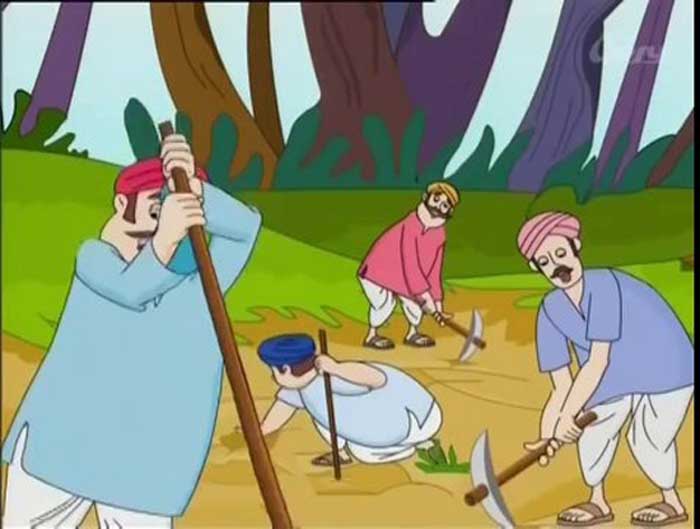
2.The Hidden Treasure
Once there lived an old man. He had three idle sons. They did not work in his fields. This worried the farmer. He was in his deathbed. He feared that his sons would suffer much after his death. Thinking that he called his sons and said, “My sons, there lies a great treasure hidden in my fields.” Saying this, he left the world for good. All the three sons cried out at the same time. However, after his death, the sons began to dig the fields in search of the hidden treasures. But they would not find out any treasure. Afterward, they sowed seeds in the fields. In time, the fields which were barren before yielded plenty of crops. Now the sons realized the truth of the words of their father. They exactly understood that the crops were the hidden treasures. They could realize the value of labour. Henceforth, they shook off their idleness. They became stout and active. They cultivated their lands properly and reaped plentiful harvest every year and lived happily.
Moral: Industry is the mother of good luck.
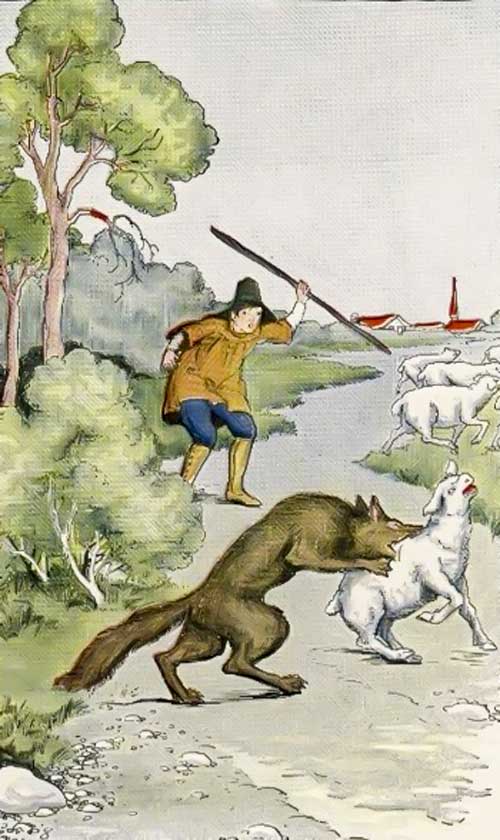
3. The Cow Boy And The Wolf
Once a cowboy used to tend his cows by the side of a deep forest. There lived wolves in the forest. The cow-boy would often raise a shout, “Wolf-Wolf”, in fun. The adjacent villagers heard his cries. They thought that a wolf had attacked his cows. So, then and there they ran to the spot to help the boy without delay. Seeing the villagers, the cow-boy giggled at that time. The villagers realized that the cow-boy had raised a falsehood. In this way, they were befooled many times and went back angrily. But, one day a wolf really came to the spot. Then the boy raised a shout. The villagers heard his cries. This time they thought that the cow-boy had raised a false shout as before he did. So nobody came to help him. The wolf fell upon the herd. At first, he killed the cows and then it killed the cowboy. At the time of his death, he had repentance. He realized the truth, “If anybody lies once, nobody trusts him later on even he speaks the truth.” By telling lies, he bought about his own death in the long run.
Moral: A liar is punished in the long run.

The Fox and the Goat
Once a fox became very thirsty. He went here and there in search of water. At last, he found a well in the distance. Going near, he leaped in and drank his fill. Now after his thirst was quenched, he tried to get out of the well. He was in despair. At this time, a goat appeared there. The goat was thirsty. He asked the fox how the water of the well tasted. The fox said, “My friend, the water of the well is very sweet to taste. It is so sweet that though I have satisfied my thirst, I wish to drink more. Come down, my dear friend, and drink to your heart’s content. The foolish goat believed it. So he jumped down into the well. As soon as the goat was there, the sly fox jumped upon his head and then without much difficulty, he got out of the well and went away. The foolish goat remained in the well. He now understood why the fox invited him to jump down into the well.
Moral: Look before you leap.

5. Failure is the pillar of success.
Robert Bruce was the king of Scotland. He reigned over the country well and his subjects were happy under his rule. But the greedy king of England tried to grab his territory and rob the independence of his countrymen. The English soldiers attacked Scotland and Robert Bruce withstood the enemy with all his forces. He tried his best to uphold the independence of his country and safeguard its liberty and glory. Unfortunately, the situation was not favorable for him. After repeated defeats, he had to retreat in despair and take shelter in a lonely cave. He passed some days there and in utter despair was thinking of giving up the struggle. Just at that time, he saw that a spider was trying to climb up to the roof of the cave. The spider failed again and again, but it did not give up its attempts. Thus it tried six times. Still, it tried again. In the next attempt, the spider succeeded in climbing up to the roof. Observing this, Bruce was inspired. He thought of fighting with the enemies again with a renewed vigor. He collected his faithful followers once more and attacked his enemies. This time the king and his men fought so bravely for the freedom of their country that the enemies were defeated. The king recovered his lost kingdom.
Moral: Patience and perseverance lead to success.

6. The Fox and the Grapes
Once a fox was very hungry. He was roaming in search of food. He came to a vineyard. It was full of ripe grapes. These were hanging from the vine. Seeing the grapes, the fox said to himself, “How lucky I am! There are so many sweet grapes. I must have some of them to satisfy my hunger.” Saying this he jumped up again and again. But unfortunately, the grapes were hanging very high up. So he would not reach them by any means. He tried again and again but all his efforts (trying or attempts) ended in smoke. That is, he was much disappointed at his failure to get the grapes. At last, he consoled himself by saying, “Grapes are sour, I don’t like them.” So saying, he left the place.
Moral: Grapes are sour.
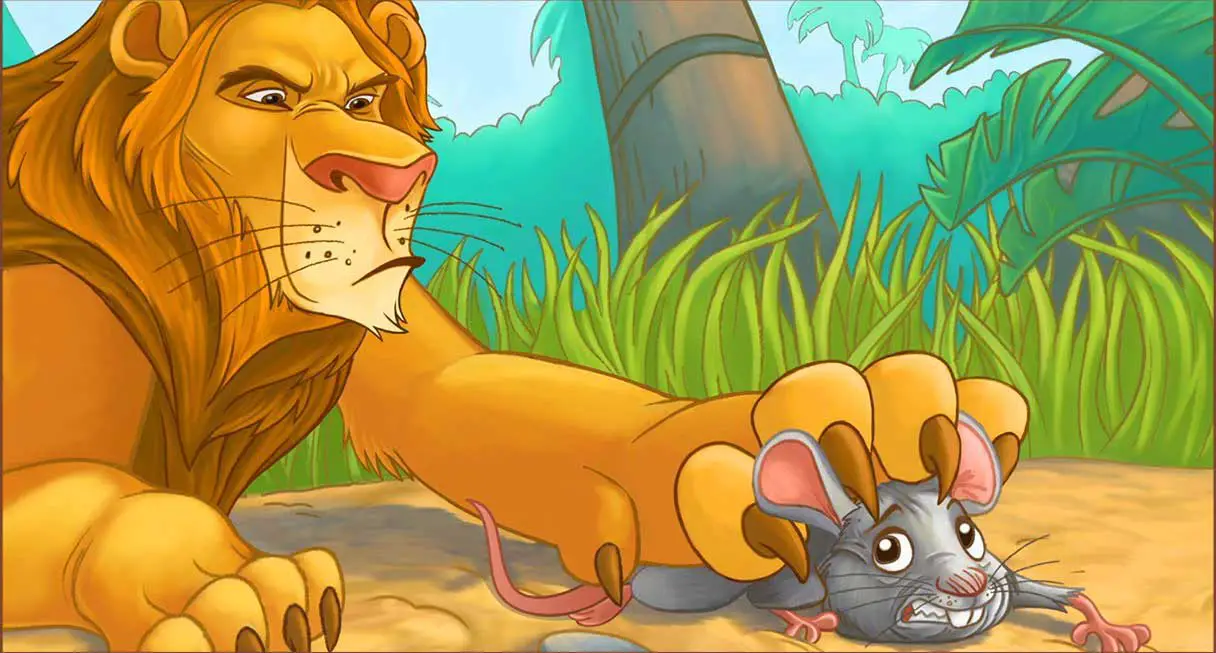
7. The Lion and the Mouse
Once a lion was sleeping in his den. At that time, a mouse was running about there in a playful mood. By chance, it ran over the lion’s face and roused him up. The lion became very angry. He caught the mouse with his paw and was about to kill him. The little mouse was very much frightened. For fear of life, he piteously said to the lion, “O Lord, I have offended you without any intention. Please pardon me and spare my life. One day perhaps I may help you.” The lion smiled to hear this. However, out of pity, he let the mouse go. A few days after the lion was caught in a hunter’s net. He roared loudly and tried hard to come out. But all was in vain. Hearing the roar, he came to the spot. He recognized his savior. Advising the lion not to roar, the mouse cut the net with his sharp teeth and sat the lion free. The lion said, “Dear little friend, you have saved my life. Even a little mouse can do a great good to a mighty lion.” In fine, The lion thanked his little friend and went away.
Moral: Even small things have their worth. Or, If you do a good deed, you will get a good return.
8. The Old man and his quarreling son
An old man had three sons. They always quarreled with one another. He always asked them not to quarrel, but they did not listen to him. This worried him much and made him very unhappy. At last, he hit upon a plan. He called all the three sons. When they came to him, he asked one of these to bring a bundle of sticks. When that son brought it, he asked him to break it. He tried heart and soul but failed. Next, the old man asked another to break it. He too failed. Then he asked the third son to break it. The third son also tried but failed to break it. When all these three sons failed, the old man asked each of them to break a single stick. They could break it easily. The old man said to them, “My dear sons, now you see the value of unity. You cannot break the whole bundle, but you can easily break each of them separately. In the same way, if you live together without quarreling, nobody can do harm to you easily. But if you live separate, your enemies can easily do your harm.” The sons felt the truth of his words. They understood the value of unity. Henceforth they stopped quarreling and lived together in peace and happiness.
Moral: Unity is strength Or, United we stand and divided we fall.
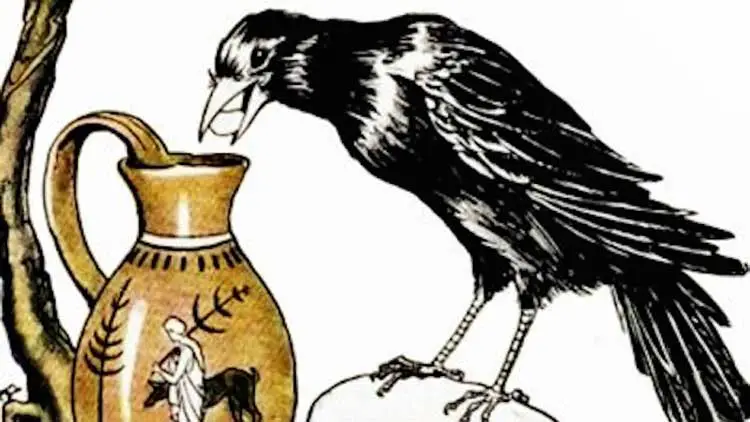
9. The Crow and the Pitcher
It was a summer day and a crow became very thirsty. He searched for water here and there but found no water anywhere. Getting tired, the crow sat on the branch of a tree in a garden. He came near it and found that there was a little water at the bottom of the pitcher. But it was so low that he could not reach it. So he tried to overturn the pitcher but the pitcher was very heavy. Consequently, he failed to turn it upside down. The crow was very intelligent. He thought of a clever way of getting water. Fortunately, he saw some stones lying near the pitcher. Then he hit upon a plan. He picked up (or, collected) the stones and threw them into the pitcher one by one. Gradually the water rose and it came up to the mouth of the pitcher. At last, the crow was able to drink it to its heart’s content. Then he flew away.
Moral: Necessity is the mother of invention. Or, Where there is a will, there is away.
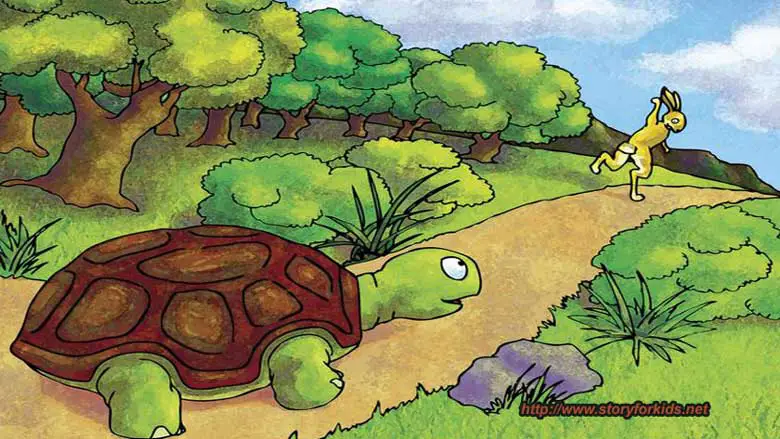
10. The Hare And The Tortoise
A hare and a tortoise were good friends. The hare laughed at the tortoise for his slow speed. The tortoise became very angry at this. He challenged the hare to run a race. He liked to see who would win the race. The hare readily agreed to the proposal because he knew that the tortoise could never defeat him in the race. The starting place was fixed. A post at a distance was the goal. At that time a fox was present there. He was the starter. He gave the signal. The race began. The hare began to run and the tortoise began to walk slowly. After running a few yards the hare looked behind and saw that the tortoise was far behind. Then he thought of taking a nap. He would wake up soon and run again and reach the goal first. Thinking so, he fell into a sleep. In the meantime, the tortoise went on slowly but steadily towards the goal. He did not stop even for a moment. When he came near the goal, the hare woke up. Then the hare ran very fast. It is a matter of sorrow that he could not overtake the tortoise. In the meantime, the tortoise reached the goal or destination and defeated the hare.
Moral: Slow and steady wins the race.
11. The Golden Goose
A greedy farmer had a wonderful goose. It had a peculiar habit. It laid a golden egg every day. The farmer was highly glad when he got a golden egg. He hid the eggs in a box. Afterward, he sold one by one. In a few days, he became a rich man. He lived a very luxurious life. But the man was very greedy. He was not extremely satisfied with getting one golden egg every morning. He wanted to become richer still. He thought of getting at once all the golden eggs, from the goose. The foolish man did not know that the goose could lay only one egg daily. So one morning when he got one egg only, he cut open the belly of the goose to get all the eggs at a time. Unfortunately, he found that there were no eggs inside the body of the goose. The foolish farmer felt repentant for his action. He got no eggs. On the contrary, he lost the invaluable goose that gave him a golden egg every day.
Moral: Grasp all, lose all.
12. Honesty is the best policy
Once there lived a poor wood-cutter. But he was very honest. He used to cut wood in the forest. One day he was cutting wood by the side of a river. While at work, suddenly his axe fell off his hand into the river. He found no way to recover his axe. Finding himself completely helpless, he sat down on the riverside weeping and bewailing. The water goddess saw his helplessness and asked him about the cause of his sorrow. The poor wood-cutter told him about his mishap. Hearing this, the goddess dived into the river and appeared before the wood-cutter with an axe of gold in hand. The goddess enquired, “Is this your axe?”. “No”, replied the woodcutter. Then the goddess dived into the river second time and brought a silver axe. This time also the honest wood-cutter said that the axe was not his. The water goddess dived into the water for the third time and appeared before the woodcutter with his real axe. The woodcutter became very glad to see his own axe. Being pleased with his honesty, the water goddess gave away the wood-cutter the two other axes. Afterward, the woodcutter passed his days happily. Thus, the honest wood-cutter was rewarded for his honesty.
Moral: Honesty is rewarded, dishonesty is punished.
13. Bayezid’s Obedience
Bayezid Bostami was a small boy. In his childhood, he was a very obedient and dutiful boy to his mother. Once Bayezid was studying by the bed of his ailing mother. It was dead of night. His mother was in a deep sleep. All on a sudden his ailing mother got up from sleep and asked Bayezid to give her a glass of water. Instantly Bayezid went to the kitchen to fetch water from the jar. But unfortunately, there was not a drop of water in it. So Bayezid went to a distant fountain with the jar and brought water for his mother. He found that his mother was asleep again. Bayezid thought that he should not break her mother’s sleep. So he remained standing still beside his mother’s bed with a glass of water in his hand. Thus the rest of the night passed by. In the morning his mother woke up. She was highly surprised at seeing Bayezid standing with a glass of water beside her bed. “Oh my son! Why are you standing by my bed?” Mother, asked me to give you a glass of water.” “Is it true?” “Yes, Mother.” “Oh, Allah! Bless my child.” Her heart was filled with a unique love for Bayezid. She embraced her son with profound love and prayed for him to God from
of heart. Afterward, Bavezid became a great saint and he is still respectable to all of us. So Bayezid will be remembered from generation to generation for his extraordinary devotion to his mother.
Moral: A glaring example of a devoted boy to his mother.
14. A king and an astrologer
Once upon a time, there was a king in Banaras of India. He was interested to know his future from the astrologer. By the by, he heard that a famous astrologer arrived at the capital city. He sent an invitation to that astrologer for paying a kind visit to his court. Accordingly, the astrologer appeared before him. When he was present in front of the king, the king asked him to tell him about his future. After astrological calculation, the astrologer said that his subjects would revolt against him and he would be killed at the time of his losing the kingdom. At this, the king became furious because his subjects loved him very much. The king said to the astrologer, “You rogue! you have no right of living anymore in the world. You are in the habit of destroying peace and happiness”. He condemned him to death. But another question had peeped into his mind before the astrologer was sent for execution. The king asked the astrologer, “When will you die?” With a ready wit the astrologer said, “The stars declare that I shall die only a week before your majesty”. Hearing this, the king turned pale like a dead man and thought, “If the astrologer dies today, I will die after seven days. But I don’t want to die. I want to live in this nice world”. Thinking so, the king shouted, “Drive this wretch away. Let him not come here again”. In this way, the clever astrologer saved his life.
Moral: A ready wit can save one from danger.
15. The Cats & Monkey
There lived two cats in a house. One day they together stole a piece of cake from the house of their master. Instantly they had a quarrel over their share. They could not decide to divide the cake between themselves. They exchanged a lot of hot words. They were about to fight each other. At last, they decided to go to a monkey for a proper division of bread. They asked the monkey to make two equal divisions of the cake. The monkey was very clever. He assured them that he would divide the cake equally between them. The monkey broke the cake into two pieces. Then he began to weigh the pieces in a balance. One piece would grow a bit larger than the other. He bit off a portion from the larger piece and it now became smaller than the other piece. Thus each time he put the unequal portions on the balance and bit a portion of it to make them equal. Thus he tactfully ate up the entire cake. The cats could realize their foolishness and felt sorry for losing their cake. The cats indeed left the place becoming sadder and wiser.
Moral: The fools fall prey to the cunning one.
16. The Ant and the dove
Once upon a time there lived a dove in a bush of a wood. So to speak, it was passing its days very happily. One day while he was sitting on a tree beside a river, he suddenly saw an ant. The ant became very thirsty. It went to that river to quench its thirst. When the ant began to drink water, a wave swept it away. The ant was about to drown. The dove felt pity for the ant. It wanted to save the ant. So it dropped a leaf into the water in front of the Ant. The ant swam to the leaf. After a while, the leaf was drifted to the bank. Then the ant reached the shore safely. The ant became very much grateful to the dove. A few days later, the ant was seeking food under that tree. Then it noticed that a hunter had aimed at the dove. Unfortunately, the dove did not know it. The ant thought, “I must save the life of the dove” Then and there the ant went up to the hunter and bit on the right leg of the hunter. At this, the hunter cried out painfully and the bullet missed its aim. At that moment, the dove got the chance to fly. In this way, the ant saved the dove’s life.
Moral: Live and let live.
17. The naughty boys and the frogs
In a village there was a pond. The water in the pond was very dirty. There lived many frogs in the water. They used to play together in the water all day long. One day some boys were passing by the pond. They saw the frogs playing in the pond. Seeing this, they began to throw stones at the frogs and made a funny. Some frogs were seriously hurt and some were even dying. It delighted the boys. They were throwing some more stones at them. The frogs became very much puzzled and did not know what to do. They became anxious too for their lives. The oldest frog called the boys and said, “Dear little boys, why are you throwing stones at us? we don’t do any harm to you. Why do you become so cruel to us? Some of us have already died. Many of us have been hurt”. The boys said, ‘We are just playing. We don’t hurt you. We are only throwing stones”. The old frog said to the boys, “Please stop your cruel play. Because what’s play to you is death to us”. The boys now felt very sorry for their misdeed. So they stopped their cruel task and went home with a heavy heart.
Moral: What is the play to one is death to another.
18. The Farmer and the Nobleman
Oneday a farmer was taking some sacks of wheat to a mill. The mile was a few kilometers away. On the way, the horse stumbled and one of the sacks fell to the ground. It was too heavy for the farmer to lift and there was nobody around to help him. He became upset. Meanwhile, he saw a horseman coming towards him. His heart jumped. As the rider was coming nearer, the farmer recognized him. He was the nobleman who lived in a grand house at the top of the hill. The farmer thought that it was not proper for him to seek help from the person of a high rank. So, he dared not approach the rider. The Poorman was at a complete loss. The nobleman was very generous. He was a gentleman. He stopped in front of the farmer and got down from the horse. He came forward to help the farmer willingly. Then he helped the farmer to lift the heavy sack up and set it on the horseback. The farmer became grateful to the horseman. But the horseman replied that he just had done as a humanitarian duty and responsibility. He suggested that every man should come forward with a helping hand in other’s distress. This is nothing but the reflection of a nobleman.
Moral: Everyone should do something in the danger of others.
19. The Fox without a tail
Once a fox was roaming about in search of food. Unfortunately, he was caught in a trap. He struggled hard to get out of the trap but could not escape. The owner of the land came and observed the situation. He threw a knife to the fox and it (knife) hurt the tail of the fox. The fox got free loosing its tail. Then the fox was very sorry at the loss of his tail. He felt very ashamed to mix with the other foxes without the tail. However, he hit upon a plan. He called a meeting of the foxes. He told them that the man has no tail. It was a useless thing and an unnecessary burden. So he cut-off his tail and felt great relief. He advised the other foxes to cut-off their tails like him. They would then feel very happy like him. But an old fox understood the ill motive of the fox. He said that they were not fools. He could understand how he lost his tail. Having lost his own tail, he wanted others to cut- off their tails. But they could not do so. The other foxes now realized the intention of the tailless fox. They supported the old fox and drove away from the tailless fox.
Moral: Intelligent people can see through the evil motive of a man who wants others to suffer like him.
20. The Sun and the Wind
Once the sun and the wind quarreled over their strength. Each of them claimed to be stronger than the other. They decided to test their strength. They saw a man who was wearing a coat. It was decided that he who would be able to make the man put off his coat, would be the winner. The wind was boastful. He began to blow an icy blast as hard as he could. The man clasped his coat tighter around himself and sat down behind a hill(rock) to escape himself from the gale. The wind failed to make him put off his coat. So the wind had to give up his hope. Then it was the turn of the sun. He (sun) began to shine brightly. The heat was quite unbearable. The man felt very hot. He found it too hot to walk with the coat on. That is, he could not bear the heat. He took off his coat. In the long run, the sun claimed its victory over the wind having proved his strength.
Moral: With whom lies the strength?
21. The Lion and the Man
One day a man was walking along the forest roadway. He saw a cage under a big tree. Inside the cage, a lion was trapped. Seeing the man, the lion called him, “Hello, dear Sir, I found this cage here and walked into it accidentally. The door closed behind me. Won’t you open the door please?” He took pity on the lion and opened the door of the cage. The lion came out of the cage and immediately wanted to kill him. Just then a jackal came along and enquired about the matter. The man said to the jackal, “The lion was in this cage and asked me to open the door. I opened the cage. Now the lion wants to kill me.” The jackal pretended surprise and said to the lion, “Dear lion, you are huge and the cage is small. I can’t believe that you were in the cage”. The man is not speaking the truth. The lion said, “The man is, of course, speaking the truth. I was in that cage”. On hearing this, the jackal once more showed his astonishment and asked the lion, “Would you mind providing it to me, sir, so that I may be well convinced?”. In reply, the lion walked into the cage angrily. At once the jackal closed the door. “Good-bye, dear lion. You look nice in that cage only.” said the jackal. The man thanked the jackal very much and walked away without fear. Thus the clever jackal saved the man’s life.
Moral: Never show mercy to those who do not deserve it.
22. Belling the Cat or Who will bell the cat?
Once upon a time, many mice lived together in a house. They were doing a lot of harm to the house. The master was much annoyed and made a plan to get rid of them. He bought a cat to kill the rats. The mice were in great trouble and difficulty. They could not move freely as before. They held a meeting to discuss the matter. In this regard, many plans were discussed but failed to come true. At last a young mouse stood up to speak. “I have a good plan for your consideration,” said the little mouse, “Let us tie a bell around the cat’s neck. Whenever he comes, the bell will ring and we will be warned”. The plan appeared to be acceptable. All the mice thanked the young mouse for his good plan. At this time an old mouse stood up. “The plan is good indeed”, said the old mouse, “But I have one question to put to the young mouse: Who will bell the cat?” No one came forward to perform the proposed job. Soon the cat came there and they all ran away into their holes.
Moral: It is easy to advise but difficult to practice.
23. An intelligent boy who saved a train from accident
An intelligent boy of 12 years was tending cows near a railway bridge. Suddenly he found a crack on the railway bridge. He began to think how he would inform the nearest railway station about the damaged condition of the bridge. The station was at a great distance. In the meantime, the cowboy saw that a passenger train was coming towards the bridge. He became upset about what to do. He feared that an accident would certainly occur. He had some important business but he could not give importance to his personal business. The probability of an imminent dreadful accident filled his mind with horror. Then and there putting off his redshirt, he held it high in his right hand. He thought that the train would halt if the red flag was waved. He began to wave it desperately. The driver could understand of any dangerous outcome. He stopped the train and came down. He found a big crack on the railway bridge. All the passengers praised the cowboy as their lives were saved by the boy. The railway authorities gave the boy a handsome reward for his presence of mind.
Moral: Nobility is a great virtue.
24. King Midas & his daughter
Once there was a king named Midas in ancient Greece. He had a pretty little daughter. The king loved her dearly from the core of heart. When he returned home from outside, the daughter .came to him and he took her in his arms. It was the reflection of reciprocal love… Midas extremely loved gold. He was very greedy. Though he had a lot of gold, he wanted more and more. One day he was thinking about gold. He imagined if he had the golden touch, he would be the richest and happiest man in the world. According to his wish, God as it were, granted his appeal instantly. After a moment the king went to his garden and sat under an apple tree. It is needless to say that the tree was full of apples. Then and there a ripe apple fell beside the king. He took the apple without hesitation. As soon as he touched it, the apple turned into gold. He became surprised at this. He found that he got the power of golden touch. He said to himself that it was absolutely impossible. However, then whatever he touched, everything turned into gold. Afterward, he entered his house. Then his little daughter came to him and he took her on his lap. Unfortunately, the king found that her beloved daughter had turned into gold and became a lifeless statue. The king became upset at this. Midas cried out pathetically to the God to forgive him. He said, “I am sorry, I can not understand it. Please forgive me. I want my daughter human being again”. Then the kind God took the golden touch away and his daughter was brought back to life. Midas now promised that he would no more hanker after riches.
Moral: Greed is sure to bring on grief
25. Ferdousi and Sultan Mahmud
Once upon a time, there was a poet named Ferdousi during the reign of Sultan Mahmud. One day he was thinking to publish an epic about him. So he asked the poet, Ferdousi and told him to write an epic. Ferdousi agreed at this proposal without any hesitation. Sultan again told him that he would give him a piece of gold for each verse. According to the condition, the poet started writing the epic ‘Shahanama’, in honor of Sultan Mahmud. When the epic was completed, it was found to contain sixty thousand verses. Then the poet went to the Sultan. He offered him the epic containing sixty thousand verses and demanded to have the promised money. Sultan became surprised at hearing this. He offered the poet sixty thousand silvers. The poet instantly refused to take them. Being angry and frustrated, the poet left the court and went to his house. Returning home, he became puzzled and felt very sick. Unfortunately, he embraced death after a few years. Afterward, the Sultan could understand his foolishness. He repented and felt very sorry. Then he asked his messengers and sent them to the poet’s house with sixty thousand gold pieces which he promised before. But it was too late. When they reached the poet’s house, they saw a heart-rending (heart-touching) scene. They saw that his dead body was being carried out for burial.
Moral: It is a great virtue to keep a promise.
26. The Justice of Quazi
Or A Just ruler and a brave Qazi Giasuddin Azam Shah was the ruler of Bengal. He was a kind and just ruler. He was very expert in archery. Once he was hunting in a forest. Unfortunately one of his arrows hurt a young man. The young man was seriously wounded and afterward, he died. The aged mother of the young man became upset because he was the only son of that old woman. She went to the Qazi and prayed for justice before him. The Qazi was a fearless upright judge of the times. He never feared anybody to perform his duties properly and faithfully. The king was summoned to appear before the. Qazi. The king went there instantly and admitted his guilt spontaneously. The Qazi ordered the king to pay full compensation to the family of the old woman. The king readily supported the Qazi’s order and paid the fine without delay. When leaving the court, the king drew his sword and said to the Qazi, “If today, you failed to discharge your duties as a judge fearing me, I would have beheaded you with this sword”. Then the Qazi got down of his seat and said to the king, “If you disobeyed my decision, I would have punished you seriously with my cane”.
Moral: Justice should be impartial.
27. A thief in Arabia
Once upon a time there was a thief in Arabia. He used to steal at almost every night. The neighborhood could not live in peace for fear of him. The common people discussed regarding the matter among them and then complained about him to the prophet (sm). One day the Prophet asked him and told him not to steal. The thief politely replied that he could not do this bad work further. He begged pardon to the prophet. Then the Prophet (sm) advised him not to tell a lie and mentioned that you must promise that you would never tell a lie. The thief then and there agreed at this proposal. He • became happy and went away. At the time of sleeping, he felt uneasy. So he went out of his room to steal at the dead of night. On the way, he met a man unexpectedly. The man asked him where he was going and why he was out of his home at the dead of night. The thief could rot steal that night. Thus he came back home. This happened days together. The thief went out to steal from any surrounding family but could not do so as he could not tell a lie. Gradually he lost the habit of stealing However he could also realize the importance of the words of the holy prophet(sm). He was also changed spiritually. In this way, the thief became a man of good character. It is really appreciable and beneficial to the society.
Moral: Example is better than precept.
28. Sheikh Saadi and his teaching
Sheikh Saadi was a very eminent poet of Iran. He used to put on the simple dress. One day he was going to the court of the king of Iran. On the way it became night. So, he took shelter in the house of a rich man. He had a very plain and simple dress on. The servants of the rich man took him to be an ordinary man. They did not show him due respect. The next day, the poet left the house of the rich man. After certain days he went to the court of the king as invited. Then he put on a gorgeous dress. While leaving the court, it was night and Saadi again took shelter in the house of that Richman. At this time the servants of the Richman welcomed him cordially. They showed him respect like a rich man. They supplied him with rich dishes. The poet thought himself why he was respected. He realized that the dress which he put on was very expensive. That’s why he was entertained with a special care. Thinking so, the poet began to put dishes into his pocket. Seeing this, the servants became surprised. They asked him, “What are you doing, sir?” He replied that the dishes were for his dress. The servants understood their fault. They begged forgiveness of the poet,
Moral: Dress does not make one great.
29. A crocodile & the cunning fox
Once there lived a crocodile in a river. A cunning fox also lived on the bank of that river. The crocodile and the fox had a great friendship. They discussed their sorrows and feelings at the end of the day. The crocodile had four children who wished to be educated. She went to the fox and requested him to educate her children. The fox agreed gladly. Being satisfied, the crocodile left all her children to the fox. Then she went back to the river. However, he ate one of them and kept the other three. After some days the crocodile came to the fox to see her beloved children. The fox showed her the three children and showed one of them twice. The fox told her that the children were learning attentively. Hearing this, the crocodile became highly pleased and left the place. In the meantime, the fox again ate one of them. A few days later, she again came to see her children. This time he showed one child thrice. The crocodile was very simple-minded. She would not understand the ill motive of the fox. She became satisfied and went away. The next week the crocodile again came to see her children. In the meantime, he also ate the last one. That is he ate up all the four children and left the place forever. After a week the crocodile again came with the joyous mind to take away her children. It is a matter of sorrow that she found nobody in the jungle. She looked for her beloved children but found none of them. In fine, she realized the matter and left the place for good. As the fox was very cunning, the crocodile should not trust him absolutely and leave her children in the care of such a bad element.
Moral: A naughty one should not be trusted.
30. The Town of Hamelin and the rats
Once upon a time, the town of Hamelin in Germany was faced with a serious problem. It was full of rats. The rats were very big and fierce. The town was badly disturbed and damaged by rats. In this situation, the Mayor of the town was at a loss and called a meeting of the Counsellors and Elite persons to discuss their problems for hours together. But they could not find any solution. At that moment a pied piper with a colorful flute in his hand appeared before the meeting. “I will free the city from the rats”, claimed a piper, “if you pay me a handsome reward”. “Agreed!” said the Mayor. The piper began to play pipe in a wonderful tune. Hearing the sound of his flute, the rats jumped out to the roads in thousands and followed the piper. He led them to a nearby river where they were all drowned. The piper then claimed the promised amount of money. But the Mayor refused to pay such a heavy amount rather offered fifty coins. At this, the piper became angry. The piper wanted to teach them a lesson. This time the piper started piping in another magic tune. All the children of the town were attracted to the tune and came out of their houses and then followed him. He led them to a mountain cave from where they could never return. The entire town was plunged into a great grief for the foolishness of the Mayor.
Moral:Promise must be kept.
31. A fox and a crane
A fox and a crane were good friends. One day the fox invited the crane to a luncheon at his den. The crane came in time for luncheon. The fox had prepared a delicious dish for his friend. It was a tasty soup. When the crane sat down, the fox served the soup on a flat, oval dish. The luncheon started. The fox could easily drink of the soup from the oval dish, but the crane with his pointed beak could hardly enjoy the soup. The fox hurriedly finished the meal and asked the crane how he liked it. The crane understood the prank of his wicked friend and assured him that he quite enjoyed the luncheon. Now before he left, the crane invited the fox to dinner the following day. He also prepared a tasty soup but he served it in a jug with a long, narrow neck. The dinner had started, the crane could easily drink of the soup from the jug whereas the fox made a poor show. When the crane asked how he liked the soup, the fox agreed that it was very nice indeed. The fox, however, understood that he had been paid back in his own coins.
Moral : Tit for tat.
32. The dog and his shadow
Once a dog stole a piece of meat from the market. He was very happy. He was going along the side of a stream and came to the bridge. He wanted to cross the bridge. While going over the bridge, he saw that another dog was crossing the bridge with a piece of meat in its mouth. All on a sudden, a thought came across his mind. He said to himself, “If I snatch away that piece of meat, I shall have then two pieces of meat”. But he did not think for once about his shadow. His shadow reflected on the water. He saw the reflection of his own shadow is the translucent (clear) water of the stream. Anyway, he thought another dog would leave without delay, he ran to another dog quickly. Thus let by temptation, he forgot about the piece of meat of his mouth. When he gapped his mouth to snatch away that false piece of meat, the piece of meat in his mouth dropped into the water. It was carried away by the current stream of water. He saw that the piece of meat of another dog also dropped into the water as like as him. Then he realized that it was his own shadow. He said to himself, “Alas! | have lost my piece of meat. If I did not run after the dog, it would not happen. Now, nothing can be done”, Having lost his own piece of meat, the dog went away disappointed.
Moral: Greed is a curse.

No comments